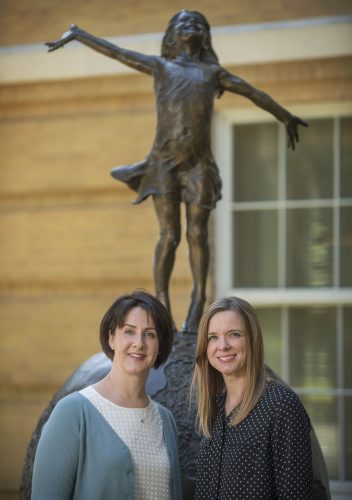Parent-Teacher Relationships Can Support Positive Behavior in Students
Kathleen Strickland-Cohen and Kathleen Kyzar want to foster partnerships while problem behavior is mild or moderate.
Parent-Teacher Relationships Can Support Positive Behavior in Students
Kathleen Strickland-Cohen and Kathleen Kyzar want to foster partnerships while problem behavior is mild or moderate.
Two education professors are investigating ways to enhance parent-teacher collaboration to support positive behavior in schoolchildren.

Kathleen Strickland-Cohen, left, and Kathleen Kyzar are studying behavior in schoolchildren that is persistent but not yet dangerous. Photo by Robert W. Hart
Kathleen Kyzar and Kathleen Strickland-Cohen have been researching family-professional partnerships within Schoolwide Positive Behavior Interventions and Support, a system of strategies to reduce discipline problems. Some schools using the system have reduced discipline referrals by as much as 60 percent, according to a 2010 study in the Journal of Positive Behavior Interventions.
Yet the system’s framework, Kyzar and Strickland-Cohen said, is almost entirely focused on schools and lacked data about how the parent-teacher relationship supports positive student behavior.
A 2015 study from the Hammill Institute on Disabilities indicated that families of children with problem behavior are at a greater risk of experiencing stress. A 2007 study in the International Journal of Disability, Development and Education showed that parent-professional partnerships could provide much-needed support.
Education has long had procedures for bringing families and educators together when problem behavior is severe, said Kyzar, assistant professor of early childhood education. The two researchers wanted to cover the continuum by fostering partnerships when problem behavior is mild or moderate.
The student behavior the two professors are studying is persistent but not yet dangerous, said Strickland-Cohen, assistant professor of special education. “We’re looking at things like out-of-seat behavior, like talking out, refusing to engage in tasks when asked, like academic work, withdrawing socially sometimes, not interacting with peers.”
To address the research quandary, the professors designed a strengths-based meeting strategy they called Partnering for Positive Behavior, which uses scripted questions to help teachers and parents of elementary-age students begin a conversation.
“Our research is pointing to the need to get parents and teachers talking before problem behaviors become severe,” Kyzar said. “Parents and teachers are not going to agree on everything, but the approach Dr. Strickland-Cohen and I are testing guides parents and teachers through a process of focusing on areas of agreement rather than disagreement.”
“Our research is pointing to the need to get parents and teachers talking before problem behaviors become severe.”
Kathleen Kyzar
The professors conducted a pilot study with a few parents and teachers from Fort Worth-area school districts that already have schoolwide teacher supports in place.
Kyzar and Strickland-Cohen began with the “student’s strengths, what they excel at,” said Katya Medeiros, a fourth- and fifth-grade special education teacher who participated with a class parent.
“Let’s say I ask my students to clean up the blocks that they’re playing with,” Medeiros said. “My expectation is that they will do it themselves. But if Mom says it’s time to clean up the blocks at home, and Mom does it for them, then I know they won’t do it in the classroom. It’s finding what we agree on, and if Mom does everything for them at home, letting [the students] do more at home — finding a middle ground.
“There were, I think, three parents I was struggling with last year,” Medeiros said. “And I thought, ‘Let’s try it with one,’ and it worked so well I decided to try it with the others.”
Feedback from the study has been overwhelmingly positive so far, Kyzar said. “It keeps us wanting to do this work.”
Strickland-Cohen has shared the results of the research with her students. As she explained, this “gets at why I do what I do. We really want to have an impact on teachers so that we can have an impact on kids.”

Your comments are welcome
1 Comment
Related reading:
Research + Discovery, Web Extras
TCU Magazine Podcast: Avoiding Problem Behavior in School with a New Strategy
Two assistant professors discuss effective strategies for parents and teachers to work together to best support the student.
Campus News: Alma Matters
Critical Literacy in the Classroom
Inside the Classroom: Education majors learn to approach society’s issues through children’s literature.
Letters
College Is All About Learning from Mistakes
You might have read or heard this popular story about failure. As a young man, Walt Disney was fired from a Missouri newspaper. An editor told him he “lacked creativity.”